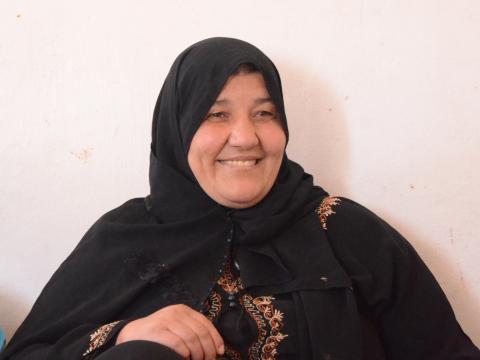When the shoemaker’s children go barefoot

By Mike Bailey, World Vision’s communication manager for the Syria crisis response, based in Jordan.
It is the beginning of Ramadan, the Muslim month of grace and fasting. We arrived at Ibtisam’s two room house just behind a pickup truck with a ladder on the roof. Three men from the Jordanian electricity company had come to cut off Ibtisam’s supply because she hasn’t paid the bill for three months and owes $50.
The Lord works in wonderful ways bringing us here at the moment of crisis. In true Ramadan spirit, the bill is miraculously paid. The electricity men go away and Ibtisam’s lights stay on for a few months longer.
Actually, Ibtisam, is true to her name, which means smile. She will never be short of inner light. Her smile lights her face the whole time we are with her. She tells us about her 12 children (which include four sets of twins) and her husband, who has survived several heart attacks and is now too sick to work. The whole household depends on the housecleaning and carpet cleaning work of this 42-year-old Jordanian grandmother.
Last week was the first day of Ramadan and Ibtisam’s children woke not expecting to eat all day because she had no food. A kind neighbour gave her a day’s work cleaning house so at six in the evening she had money to go and buy food for their Ramadan supper. She says that the children smiled when they saw her going out to work because they knew they would eat.
The poverty and financial problems for this Jordanian family have been made worse by the influx of Syrian refugees over the last year, Ibtisan says. When she moved into their current residence, the rent was 50 Jordanian Dinars ($70). Nice months and four rent increases later, it is now 170 JD ($240). This amount is beyond the unpredictable and irregular income from Ibtisam receives from cleaning work, much of which comes as charity from neighbours.
The destitution gets passed down to the next generation. Her eldest daughter, who has her own 2-year-old, is pregnant with her second child. Her husband is currently in jail serving a two month sentence for fraud (passing dud cheques).
A different start to the same story
Not far away in another run-down district of the north-western Jordanian city of Irbid, Ahad and Basila live with their four children as well as her brother and his family of five. They are all Syrian refugees who fled from their home town of Dera’a when their houses were destroyed and cousins were killed. Now they are desperate, begging on the street and selling the food vouchers they get from UNHCR so they can buy the cheapest food available.
Ahad used to be a shoemaker, now his children are barefoot. Like many Syrian refugees, he asks us not to photograph him or the other adults. This is partly because he fears repercussions for relatives still in Syria but it is also that he is so ashamed of his situation.
The deteriorating poverty of Jordanian families and the vulnerability of Syrian refugees is the tragedy of the Syria crisis. It causes tensions between the communities in Jordan, just as it does in Lebanon.
Animosity and resentment is replacing the generosity and gratitude which marked the interaction between host communities and refugees in the early months of the crisis. It threatens to export the violence and destabilisation from Syria to the refugee host countries.
Responses of host governments and the international community must be effective in meeting the needs of the host communities, as much as for refugees.
To learn about the situation of the host communities in Lebanon, read World Vision’s report Under Pressure.